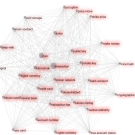Human-computer interaction (HCI) is concerned with the principles, theories, methods and models for understanding, designing, prototyping and evaluating computing systems that interact with people. The goal is to create systems that are usable, useful and enjoyable for people to use individually and collectively. The HCI community in UC Davis comprises interdisciplinary faculty, researchers and students from multiple departments, such as computer science, design, engineering and communication. We are interested in a range of topics in HCI, such as designing and engineering wearable and tangible objects, interactive visualizations and virtual reality/augmented reality, interactive dialogue systems and chatbots and investigating and transforming large-scale social behaviors through social computing interaction designs.





